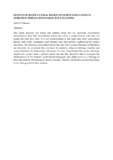Please use this identifier to cite or link to this item:
https://cris.library.msu.ac.zw//handle/11408/1750| Title: | Effects of sociocultural beliefs on science education in Zimbabwe: implications for science teaching | Authors: | Chiromo, Alois S. | Keywords: | Children, sociocultural characteristics | Issue Date: | 2004 | Publisher: | African Journals Online | Series/Report no.: | Indilinga: African Journal of Indigenous Knowledge Systems;Vol. 3, No. 2; p. 126-133 | Abstract: | This paper discusses the notion that children bring into the classroom sociocultural characteristics from their environment, which may create a wedge between what they are taught and what they learn. It is also acknowledged in this paper that some sociocultural factors, such as the ‘cooperative goal structure' may have positive implications for science education. The following sociocultural factors that may affect science education in Zimbabwe are discussed: sex or gender bias, reverence for authority, religious ideology, causality and causal attribution and relationship with nature. It is also recommended that science educators should view science from a cultural context and that they should be able to recognize the characteristics of the learners' sociocultural background that might serve as a blockage or those that promote the learning of science concepts. Teachers should then use that knowledge as the starting point of their teaching. | URI: | http://dx.doi.org/10.4314/indilinga.v3i2.26360 http://hdl.handle.net/11408/1750 |
ISSN: | 1683-0296 |
| Appears in Collections: | Research Papers |
Files in This Item:
| File | Description | Size | Format | |
|---|---|---|---|---|
| EFFECTS OF SOCIOCULTURAL BELIEFS ON SCIENCE EDUCATION IN ZIMBABWE.pdf | Abstract | 95.73 kB | Adobe PDF |  View/Open |
Page view(s)
182
checked on Feb 26, 2026
Download(s)
24
checked on Feb 26, 2026
Google ScholarTM
Check
Items in MSUIR are protected by copyright, with all rights reserved, unless otherwise indicated.



